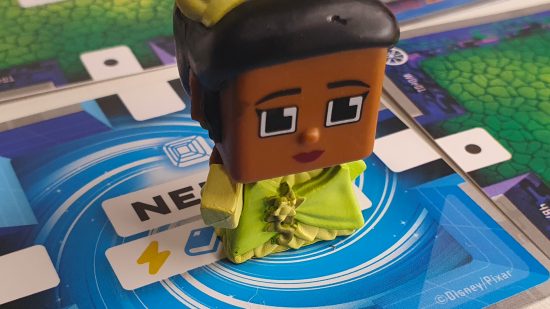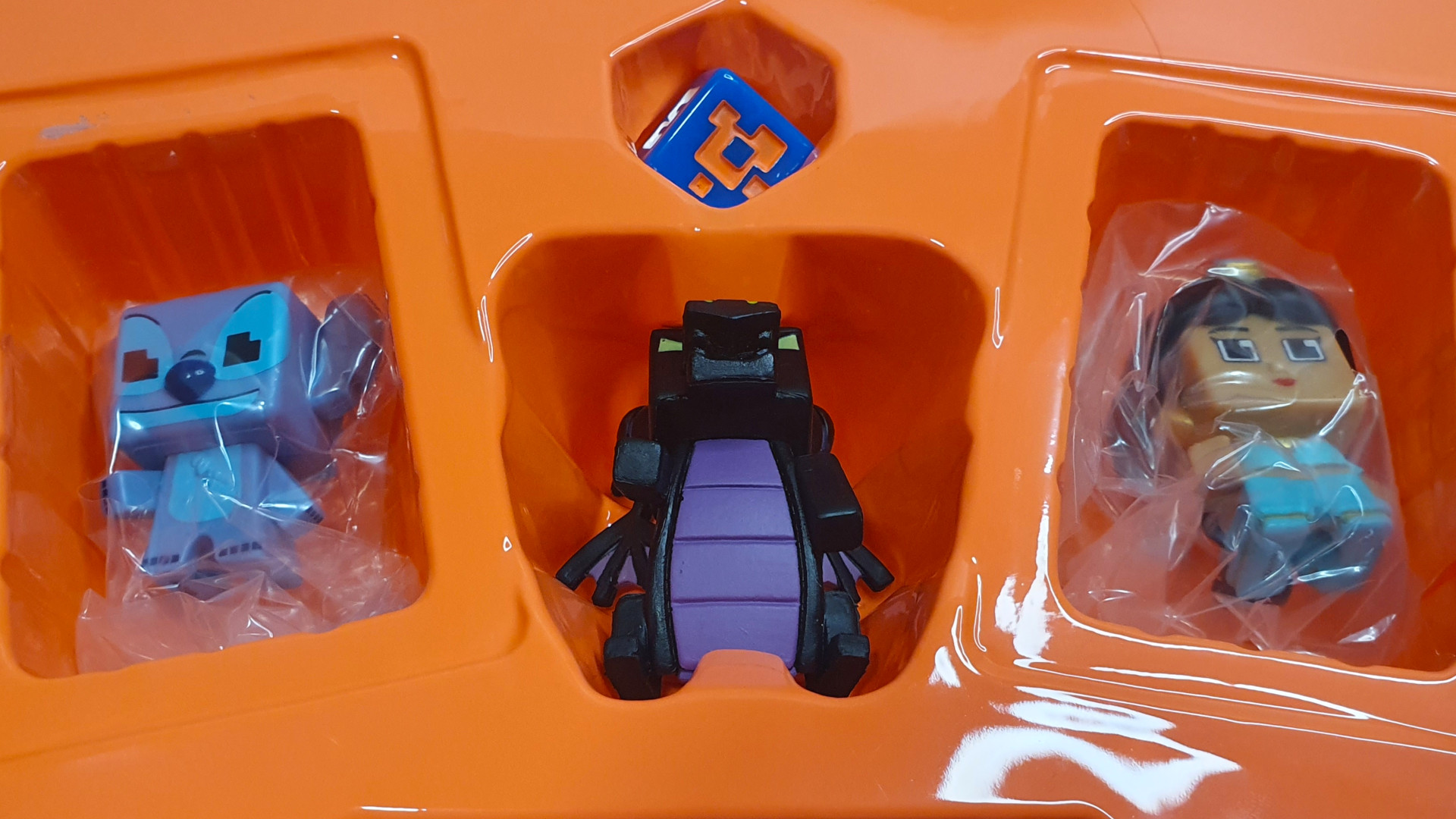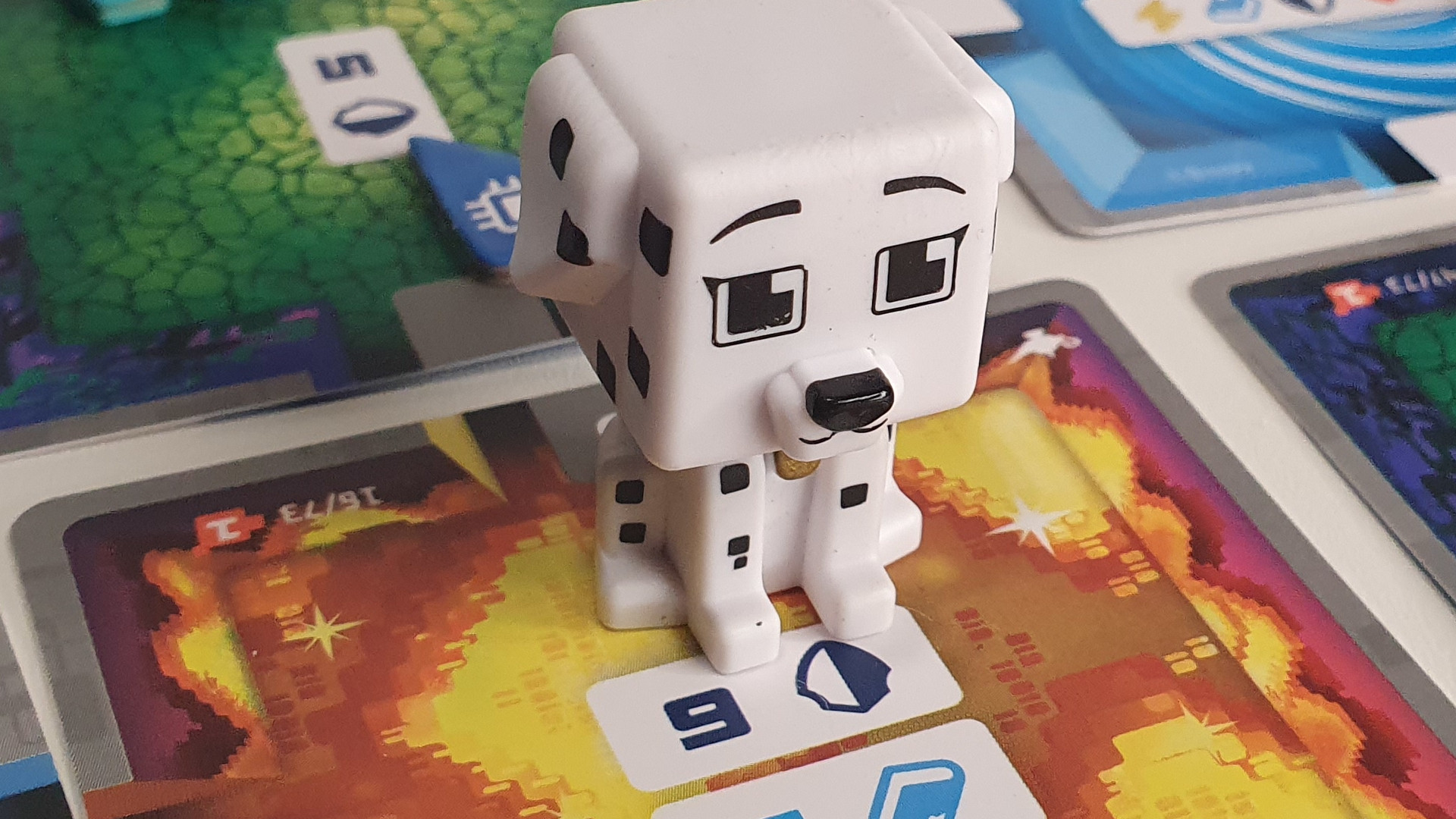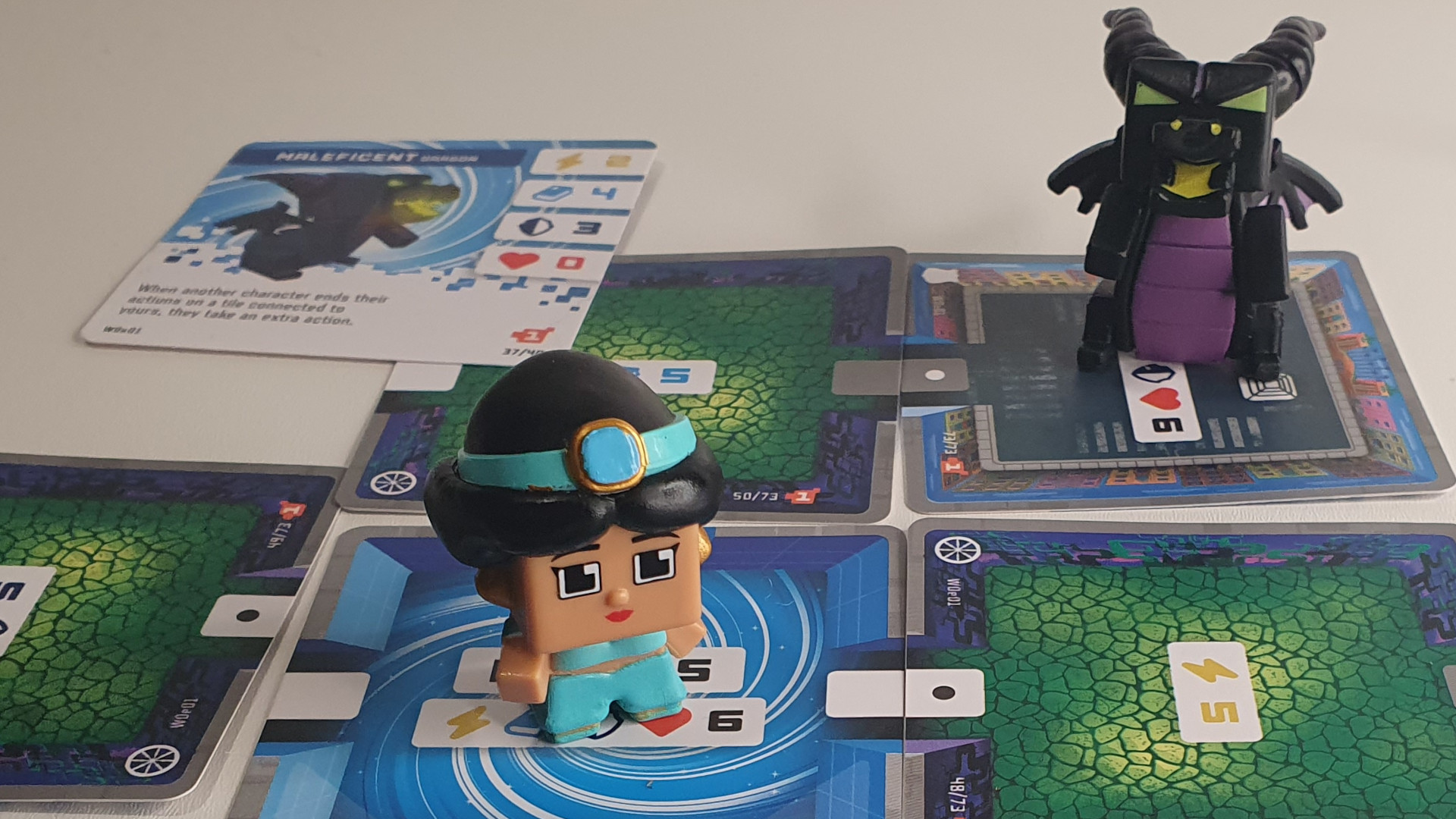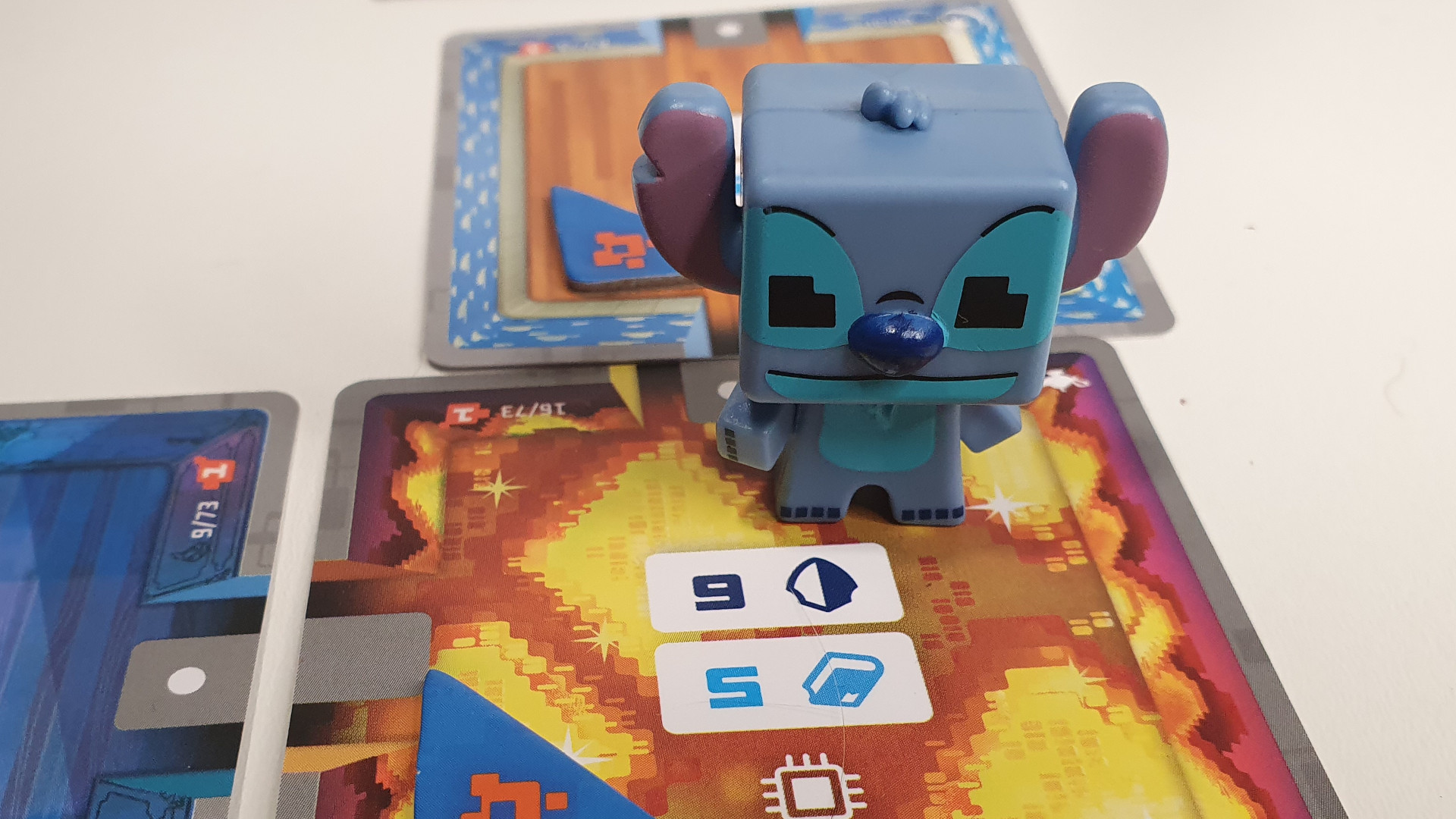Our Verdict
Charming Disney figurines are the main draw for a product that is firmly targeted at children. Simple rules and random components result in a game that will tire adults, but is flexible enough that children can treat the game rules as just one more toy in the toy chest.
The Disney Kingdomania Series 1 Super Game Pack is a board game – sort of – and it’s also the starter pack for a series of collectible vinyl Disney toys made by the team at Funko Games. Collectible, Disney, board game – all words that make our ears prick up. But how well does the package come together?
The Super Game Pack comes with five solid, blocky little Disney figurines. Though not as slick as the abstract playing pieces found in the excellent Disney Villainous, these are charming in their own way. They’re not in the Funko Pops house style, but instead have a cuboid aesthetic that looks a bit Minecraft, a bit retro video game. If you like ’em, you’ll like ’em – I think they’re fine, and my seven-year-old daughter thinks they’re great.
One figure in the pack is guaranteed to be Maleficent in her dragon form, and the pack has random selections of two more Disney characters and two items from the Disney world – we got a donut which gave me confusing Simpsons vibes, and Dr. Facilier’s spirit mask. Then there’s a die, character cards, room tile cards, tokens, and a single double-sided leaflet with the game rules.
That game is simple and shallow, but – for reasons I’ll explain – I’m not going to hold that against it. The product has other merits, even if it’s never going to make it onto our best board games list.
It’s a solo or co-operative game in which Disney characters try to patch up the video game they live in before glitches destroy it – a slightly confused theme, but no more so than the upcoming Disney Lorcana card game, and frankly a lot more sane than the Kingdom Hearts Disney video game series. It’s similar to Pandemic, or the more child friendly Forbidden Island, but objectively much worse.
Play starts by building out a level from a central nexus using room tile cards. Two tiles indicate that you should place a ‘glitch’ token on them, another two want a ‘patch’ token, and one more is ‘locked’ and will hold a character or item until the players unlock it.
With two actions a turn, players can move around the map, attempt to unlock the locked room to add the item or character to their team, or try to push patches towards the nexus and glitches away from it.
Each character has a card with a set of four stats – hearts, books, lightning, shields – and players push or unlock by rolling the custom die and adding the relevant stat to try and beat a matching, numbered symbol on the tile of the room they’re in.
Diamonds on the die always succeed, while a glitch symbol moves all the glitch tokens closer to the centre of the board. At the end of the turn, players roll once more to see if the glitches move. Should a turn start with two glitches on it the player loses – two patches and they win.
Different Disney characters have different stats, plus a special ability – Dragon Maleficent can swap places with another figure on the same level – which they can use once, regaining it when they start a turn on the Nexus. This gives a minor mechanical differentiation between the characters, though by and large every character does the same thing in every game.
There’s enough tiles in the box for two players to each construct a level, and a character can travel between levels via “warp” symbols found on the nexus and the locked tile. Though it’s the suggested multiplayer mode, my daughter resists playing this way vehemently, requiring we both act on the same board. I’m pretty sure that’s fear of the unknown, rather than any problem with the game design.
Rest assured, the game does have problems. Randomisation is everywhere, from map layout to the models you get in a pack. Suppose you lay out a map where all the glitches are two spaces away from the Nexus. Make two rolls, roll two glitch symbols – lose the game. Or maybe you never roll a single glitch?
Losing depends on luck, the winning path is transparent. It is quick, snack-sized even, but being short doesn’t excuse it being bad. The thing is, my daughter loves it.
Obviously she loves the figures – they’re cute, colourful, pleasingly palm-sized. That charm isn’t just in the Disney licence – she’s never seen Lilo and Stitch, but has taken a real shine to the boxy Stitch figure that came in our pack. But I was not expecting to hear “this is my favourite game ever!”
This isn’t for lack of experience – as a game reviewer’s daughter she could hardly avoid board games – and she’s a fan of the excellent Kingdomino, beautiful Takenoko, and the child-friendly Ticket To Ride: My First Journey. Though I expect her enthusiasm with Kingdomina to fade over time, it’s not just the novelty that’s caught her imagination.
Every part of this board game is atomised and modular, so that you can buy a random booster ball with two random characters and enough tiles for one level and still be guaranteed a functional game. To accommodate that variance, the rules are so quick and the difficulty so arbitrary that it’s more of a game-like procedure than an actual game. That would be a weakness if the game was targeting adults – but it isn’t.
Compared to other toys, board games are prescriptive and immutable. Adults usually find that pleasurable – providing the rules create an interesting space to be challenged or surprise – but children can find it frustrating. Unlike other games that children play, board games break when you change the rules.
This board game doesn’t break if you change the rules. Not because it’s clever, but because it’s dumb. It’s a Duplo set of board-game components, basic board game rules, and procedures. The rules are there, but they’re more like suggestions – why not ignore character abilities, or use them every turn? Double the characters? If none of it matters, it’s all up for grabs.
For a child who enjoys the procedures, movements, rituals of board games, and who wants an attractive toy with which to rearrange them, stretch them, and break them, Kingdomania hits the spot.
I can’t call this a great Disney board game, and it’s not going near our lists of the best kids board games or best family board games. But working out why my daughter enjoys it has challenged my assumptions about what a ‘good’ children’s game even is. Can I call a children’s game bad if its flaws only affect adults?
As a board game Kingdomania is a bit bobbins, but as a collectible toy, it’s a solid offering.
